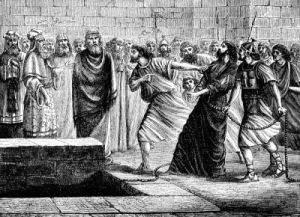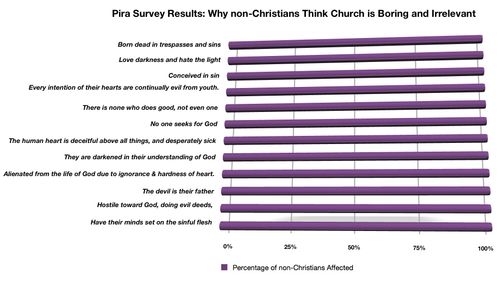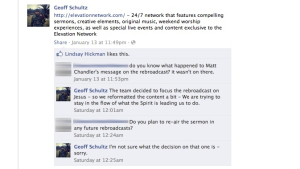Satan, the deceiver of the nations, has a sick sense of humor. He doesn't care if you read your Bible so long as you misread it and don't rightly understand what God has revealed in its pages. Furthermore, as an eyewitness to the events recorded in scripture, Satan knows full well what was happening at the time each Biblical story was lived out and fully understands what God was trying to accomplish in each person whose life is recorded in Holy Writ. That being the case, I'm convinced that Satan relishes, in a truly sick way, when he successfully deceives today's Christians into believing the exact polar opposite "truth" to the one that is actually revealed in a passage of scripture. Think of this accomplishment as the ultimate satanic irony and pulling it off requires all of Satan's cleverness and cunning.
One of the clearest examples of this type of satanic irony is how most Christians today misunderstand and misapply Jeremiah 29:11 which states, "For I know the plans I have for you, declares the LORD, plans for welfare and not for evil, to give you a future and a hope". Ripped from its context, today's popular false teachers use this verse to peddle a false gospel that says that the Good News of Christianity is that God is in your corner and has great plans for your life — plans that recognize your greatness and the latent potential for world changing significance that lies dormant inside of you. This false gospel doesn't warn sinners to flee the wrath of God against sin by repenting and trusting in Christ for the forgiveness of sins. Instead, it purposely focuses its victims on themselves and assures them that they are very important and that God isn't interested in punishing sinners but is primarily focused on assisting people achieve their true potential and discovering the champion within. The irony is that when you read this passage in context and take the time to understand what this passage of scripture is truly saying, you'll discover that this popular false gospel is what the LORD is warning the exiles of Israel about.

Even more ironic is the fact that today's popular false teachers, the ones who have taught Christians this false understanding of this passage, are identical to the false prophets that Jeremiah is warning against. It is also critical for a correct understanding of this passage to recognize that Israel was punished and sent into captivity because of their stubborn refusal to repent of their sins and that the fault for this lies in great part at the feet of the false teachers and false prophets who were teaching the exact same false message that we are hearing in many churches today. Jeremiah 23 makes this parallel clear when it says of the false teachers of Jeremiah's day:
“Thus says the LORD of hosts: “Do not listen to the words of the prophets who prophesy to you, filling you with vain hopes. They speak visions of their own minds, not from the mouth of the LORD. They say continually to those who despise the word of the LORD, ‘It shall be well with you’; and to everyone who stubbornly follows his own heart, they say, ‘No disaster shall come upon you.’” (Jeremiah 23:16–17)
In other words, Satan has deceived many Christians in the exact same way that he deceived Israel during the time of Jeremiah. The sick Satanic irony is that he's successfully resuscitated this ancient heresy by means of a false reading of Jeremiah 29, which is a passage of scripture that sternly warns against this particular false teaching. To help you see and understand this satanic irony, I've reproduced, below, a portion of Dr. Paul Kretzmann's Popular Commentary. Take a few minutes to work through this passage with Dr. Kretzmann and you'll not only have a proper understanding of Jeremiah 29:11 you'll also see Satan's sick trick for what it is and hopefully will be compelled to speak up and help open the eyes of those who've fallen for Satan's deception.
Jeremiah's Letter to the Exiles and Its Consequences: An Excerpt from Dr. Paul Kretzmann's Popular Commentary
THE CONTENTS OF THE LETTER. — Just as certain false prophets in Jerusalem had tried to arouse and maintain false hopes in the inhabitants of the capital, thus also certain men of the same type were active among the exiles who had been taken to Babylon at the time of Jeconiah. The result was that a spirit of discontent and restlessness took hold of the Jews, which not only increased the bitterness of their affliction, but also tended to break down all moral restraint. Jeremiah therefore, by God's command, sent a letter to the exiled Jews, in which he gives them some excellent rules of behavior in the midst of the trying circumstances in which they found themselves. V. 1. Now, these are the words of the letter that Jeremiah the prophet sent from Jerusalem unto the residue of the elders, to those who had survived the hardships of the exile up to that time, which were carried away captives, and to the priests, and to the prophets, and to all the people whom Nebuchadnezzar had carried away captive from Jerusalem to Babylon, to the congregation of the exiled Jews, disorganized as it was in the conditions of the exile, v. 2. (after that Jeconiah, the king, and the queen, Nehushta, the dowager, daughter of Einathan, 2 Kings 24:8,15, and the eunuchs, the courtiers or chamberlains, high court officers, the princes of Judah and Jerusalem, and the carpenters, and the smiths, all the artisans and craftsmen of the city, 2 Kings 24:16, were departed from Jerusalem,) v. 3. by the hand of Elasah, the son of Shaphan, and Gemariah, the son of Hilkiah, (whom Zedekiah, king of Judah, sent unto Babylon, to Nebuchadnezzar, king of Babylon, nothing further being known of the message carried by this embassy, except that Zedekiah ruled only by the pleasure of the Babylonian king and was bound to use the highest diplomacy to hold his position), saying, the actual wording of Jeremiah's letter now being given, v. 4. Thus saith the Lord of hosts, the God of Israel, His exact words being given in the message, as throughout the book, unto all that are carried away captives, whom I have caused to be carried away from Jerusalem unto Babylon, the fact that they were suffering the just punishment of their transgressions being made fundamental in this address, as preparing the way for repentance: v. 5. Build ye houses and dwell in them, thereby preparing for a long stay in the land of their captivity, against the advice of the false prophets who were trying to mislead them; and plant gardens, and eat the fruit of them, altogether in agreement with the idea that their homes would, for some time, be in the strange country; v. 6. take ye wives and beget sons and daughters, thereby establishing families; and take wives for your sons and give your daughters to husbands, for the giving in marriage is essentially a function of the parents, a duty which they dared not disregard, that they may bear sons and daughters, that ye may be increased there and not diminished, for the nation was not to die out during the period of the Babylonian Exile. V. 7. And seek the peace, the welfare, of the city whither I have caused you to be carried away captives, striving with all their might to promote its best interests, and pray unto the Lord for it, such intercessions being commanded by God even in the case of a heathenish government; for true religion teaches patient submission to the government in all things which are not in conflict with God's Word; for in the peace thereof shall ye have peace, the Lord blessing a country for the sake of the believers among its citizens, and they, in turn, being benefited by the blessings which the Lord grants their country. V. 8. For thus saith the Lord of hosts, the God of Israel, Let not your prophets and your diviners that be in the midst of you, whose business flourished because of the willing credulity of the people, deceive you, neither hearken to your dreams which ye cause to be dreamed, for it was the attitude of the people themselves, in encouraging prophecies of this kind, which gave them false hopes, that was at the bottom of the whole situation. V. 9. For they prophesy falsely unto you, with a lie they posed as prophets, in My name, adorning their base deceptions with the name of the Lord, insisting that He had sent them; I have not sent them, saith the Lord, their claims being utterly unfounded. Over against their deceitful promises, therefore, He tells them the plain truth concerning the length of their captivity. V. 10. For thus saith the Lord, That after seventy years be accomplished at Babylon, counting from the time the first exiles were taken to Babylon with their King Jeconiah, I will visit you, turn to them in merciful kindness, and perform My good word toward you, cause His promise to them to be fulfilled, in causing you to return to this place, to Jerusalem and Judah, the home of their fathers. V. 11. For I know the thoughts that I think toward you, He would still accomplish His merciful purposes with regard to them, saith the Lord, thoughts of peace and not of evil, to give you an expected end, literally, "future and hope," that is, the end which they desired, but which could be theirs only on condition of their showing true repentance. The Lord shows in just what manner the Jews would continue in their course: first, in vain confidence, relying upon the empty promises of the false prophets; then, in deepest despondency, believing that they were doomed. to extermination; but finally, in true repentance, when they would be accepted by the Lord. V. 12. Then shall ye call upon Me, in a realization of their sinfulness and guilt, and ye shall go and pray unto Me, and I will hearken unto you, turning to them in the grace and mercy which He much prefers to exercise. V. 13. And ye shall seek Me and find Me, when ye shall search for Me with all your heart, if their repentance proved to be sincere, of the right kind. Cp. Leviticus 26:40-45. V. 14. And I will be found of you, saith the Lord, Isaiah 55:6; and I will turn away your captivity, and I will gather you from all the nations and from all the places whither I have driven you, saith the Lord, for the Jews were finally dispersed throughout the various countries of the world empire; and I will bring you again into the place whence I caused you to be carried away captive. Cp. Deut. 4:29-30;30:3-5. The return from exile was only the beginning of the fulfillment of our prophecy, which clearly has Messianic significance. V. 15. Because ye have said, The Lord hath raised us up prophets in Babylon, literally, "as far as Babylon," the people of Judah insisting that the ministry of the prophets extended far beyond the confines of the Holy Land, and that therefore the threatening prophecy had no effect upon them, v. 16. know that thus saith the Lord of the king that sitteth upon the throne of David, in this case Zedekiah, and of all the people that dwelleth in this city, those remaining after the first company of exiles had left, and of your brethren that are not gone forth with you into captivity: v. 17. thus saith the Lord of hosts, Behold, I will send upon them the sword, the famine, and the pestilence, the dreaded scourges which are the worst punishments of nations, and will make them like vile figs, Jeremiah 24:8, that cannot be eaten, they are so evil. V. 18. And I will persecute them with the sword, with the famine, and with the pestilence and will deliver them to be removed to all the kingdoms of the earth, scattered throughout the kingdoms which belonged to the great world empire, to be a curse, an object of execration, and an astonishment, and an hissing, and a reproach, to be jeered at and treated with contempt on every side, among all the nations whither I have driven them, v. 19. because they have not hearkened to My words, saith the
Lord, which I sent unto them by My servants, the prophets, rising up early and sending them, in eager zeal for the welfare of their souls; but ye would not hear, saith the Lord. Note that the change from the third to the second person places the exiled Jews into the same class with those who were still in Judah, for all were alike guilty. V. 20. Hear ye therefore the Word of the Lord, all ye of the captivity whom I have sent from Jerusalem to Babylon, for the Chaldeans, in this instance, were only the instruments in the hands of the Lord: V. 21. Thus saith the Lord of hosts, the God of Israel, of Ahab, the son of Kolaiah, and of Zedekiah, the son of Maaseiah, two men who are otherwise unknown, which prophesy a lie unto you in My name, since they were evidently the leaders of the false prophets, Behold, I will deliver them into the hand of Nebuchadrezzar, king of Babylon, and he shall slay them before your eyes, this execution evidently taking place because the king feared their exciting and rebellious preaching, v. 22. and of them shall be taken up a curse by all the captivity of Judah which are in Babylon, that is, the exiles made this event a proverb, a formula of imprecation, saying, The Lord make thee like Zedekiah and like Ahab, whom the king of Babylon roasted in the fire, a Chaldean form of punishment in general use at that time, cp. Daniel 3:6, v. 23. because they have committed villainy in Israel, a deed of shame, a sinful folly, and have committed adultery with their neighbors' wives, acts of gross immorality often being associated with false teaching, and have spoken lying words in My name, which I have not commanded them; even I know and am a Witness, saith the Lord. Jehovah is not only intimately acquainted with the truth, but also brings it to light and testifies of it before men.
Words of Comfort In the Midst of God's Discipline
Having worked through this passage with Dr. Kretzmann you now understand that Jeremiah 29:11 is not promising some epic earthly plan or destiny for your life but is instead a message of comfort to those whom God has severely disciplined. The right way to understand this text is to read it as a message of tender fatherly love in the midst of painful discipline. These words of hope to the exiles were intended to comfort and protect them during a time when it would have been all too easy to believe that God had abandoned them. Christians today should recognize that we have similar promises given to us in the New Testament that we can cling to during those times when God is disciplining us. These words of hope are found in Hebrews 12:7–11 which says:
“It is for discipline that you have to endure. God is treating you as sons. For what son is there whom his father does not discipline? If you are left without discipline, in which all have participated, then you are illegitimate children and not sons. Besides this, we have had earthly fathers who disciplined us and we respected them. Shall we not much more be subject to the Father of spirits and live? For they disciplined us for a short time as it seemed best to them, but he disciplines us for our good, that we may share his holiness. For the moment all discipline seems painful rather than pleasant, but later it yields the peaceful fruit of righteousness to those who have been trained by it.”
Seeing Jeremiah 29:11 for what it is gives us great hope and focuses us on God's great love for us even when everything that we see and experience would convince us that God hates us and has abandoned us. But, the false twisted and satanic misreading of Jeremiah 29:11 focuses you on yourself and some mythical dream destiny that you're supposedly going to fulfill. Despite the fact that the false misreading of this text may provide some type of comfort or inspiration in the short term, in the long run it will cause its victims to despair as their bodies break down, health and wealth fail them and death approaches. Ultimately, the false misreading of Jeremiah 29:11 provides a false hope that destroys faith and leaves its victims empty, hopeless and in peril of the fires of hell.
Do you now see Satan's sick ironic trick for what it is?
χάρις ἔλεος εἰρήνη σοι,

@PirateChristian







